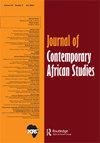口头感叹词和制作Awillo Mike作为肯尼亚现场音乐表演中“真实生活和传奇生活”的社会代表
IF 0.8
Q2 AREA STUDIES
引用次数: 0
摘要
现场音乐表演采取一种叙事形式,由“现场乐队”在歌曲和表演中集体叙述经验。在这样的演出中,一个乐队成员往往成为观众心目中“好表演”的社会代表。本文试图通过探讨肯尼亚埃尔多雷特Ja-Mnazi非洲乐队的主唱之一“Awilo”Mike Otieno如何在现场音乐表演中使用口头感叹词——在演讲叙述之间——来赢得观众的喜爱,从而对“活力”的争论有所贡献。本文基于对“Awilo”Mike Otieno的非结构化访谈收集的数据,并有目的地选择了乐队成员,为期六个月。补充数据是通过参与观察和与普通听众的非正式讨论获得的。基于批判性话语分析,本文认为现场音乐表演中的感叹词并不仅仅是话语。相反,它们是音乐家对观众行使权力的场所和手段。通过运用这种力量,音乐家能够塑造(重新)定义(重新)协商和挑战(预先)存在于听众之间的主体性,以及听众因其在社会中不同的社会地位而对他/她的主体性。这随后使他们的身体和情感现实保持一致。此外,口头感叹词使音乐家能够在叙述的经历上创造新的意义,听众可以在他们的日常生活中识别和联系起来,尽管两者都是去语境化的。使用感叹词创造一致性的能力证明了艺术家表演的有效性,并解释了他或她的受欢迎程度。本文章由计算机程序翻译,如有差异,请以英文原文为准。
Verbal interjections and the making of Awillo Mike as a social representation of “lived lives and storied lives” in live music performance in Kenya
Live music performance takes a narrative form where experiences are narrated collectively by a “live band” both in song and performance. In such a performance, one band member often becomes a social representation of “good performance” for the audience. This paper seeks to contribute to this debate on “liveness” by exploring how “Awilo” Mike Otieno, one of the lead singers of Ja-Mnazi Africa Band in Eldoret-Kenya, uses verbal interjections — in between speech narrations during live music performance — to endear himself to the audience. This paper is based on data collected using unstructured interviews with “Awilo” Mike Otieno and purposively selected Band members for a period of six months. Augmentative data was obtained by participant observation and informal discussion with regular members of the audience. Based on Critical Discourse Analysis, the paper argues that verbal interjections in live music performance are not mere discourses. Instead, they are sites and means for the musician to exercise his/her power over the audience. By exercising this power, the musician is able to shape, (re)define (re)negotiate and contest (pre)existing subjectivities among the audience, and that of the audience towards him/her due to their diverse social positions in society. This subsequently aligns their physical and emotional realities. In addition, verbal interjection enables the musician to create new meanings on the narrated experiences to that which the audience can identify and relate with in their everyday lives, despite both being decontextualized. The ability to create congruity using verbal interjections proves the effectiveness of an artiste's performance and accounts for his or her popular acceptance.
求助全文
通过发布文献求助,成功后即可免费获取论文全文。
去求助
来源期刊

Journal of Contemporary African Studies
AREA STUDIES-
CiteScore
2.20
自引率
0.00%
发文量
18
期刊介绍:
Journal of Contemporary African Studies (JCAS) is an interdisciplinary journal seeking to promote an African-centred scholarly understanding of societies on the continent and their location within the global political economy. Its scope extends across a wide range of social science and humanities disciplines with topics covered including, but not limited to, culture, development, education, environmental questions, gender, government, labour, land, leadership, political economy politics, social movements, sociology of knowledge and welfare. JCAS welcomes contributions reviewing general trends in the academic literature with a specific focus on debates and developments in Africa as part of a broader aim of contributing towards the development of viable communities of African scholarship. The journal publishes original research articles, book reviews, notes from the field, debates, research reports and occasional review essays. It also publishes special issues and welcomes proposals for new topics. JCAS is published four times a year, in January, April, July and October.
 求助内容:
求助内容: 应助结果提醒方式:
应助结果提醒方式:


